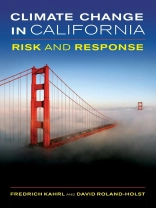California is synonymous with opportunity, prosperity, and natural beauty, but climate change will certainly influence the state’s future. Changes will affect the economy, natural resources, public health, agriculture, and the livelihoods of its residents. But how big is the risk? How will Californians adapt? What will it cost? This book is the first to ask and attempt to answer these and other questions so central to the long-term health of the state. While California is undeniably unique and diverse, the challenges it faces will be mirrored everywhere. This succinct and authoritative review of the latest evidence suggests feasible changes that can sustain prosperity, mitigate adverse impacts of climate change, and stimulate research and policy dialog across the globe.
The authors argue that the sooner society recognizes the reality of climate change risk, the more effectively we can begin adaptation to limit costs to present and future generations. They show that climate risk presents a new opportunity for innovation, supporting aspirations for prosperity in a lower carbon, climate altered future where we can continue economic progress without endangering the environment and ourselves.
Tabela de Conteúdo
Preface
Acknowledgments
Introduction
1. Economic Perspectives on Climate Adaptation
2. Agriculture, Forestry, and Fishing
3. Water
4. Energy
5. Transportation
6. Tourism and Recreation
7. Real Estate and Insurance
8. Public Health
9. Revelation or Revolution?
Index
Sobre o autor
Fredrich Kahrl recently received his Ph D from the Energy and Resources Group at the University of California, Berkeley.David Roland-Holst is Adjunct Professor in the Department of Agricultural and Resource Economics and the Department of Economics at the University of California, Berkeley.












